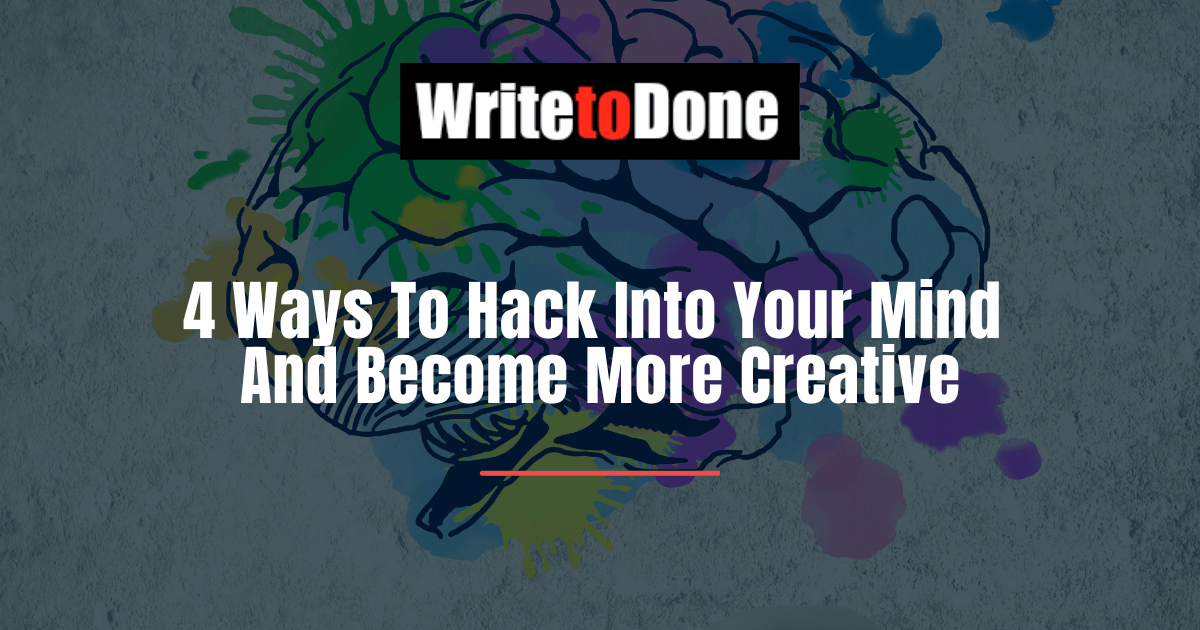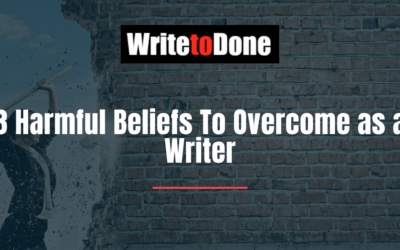What if I told you that the biggest threat to your writing is not your lack of passion, your lack of creativity, or your lack of skill?
What if I told you that the biggest threat to your writing is… your mind?
That’s right. Your mind is the biggest obstacle standing between you and all the work you are trying to accomplish.
Our mind is often the one that needs the most convincing that our writing is worthwhile. This is because our mind is hard-wired to protect us from any possible danger. You see, in order to protect us, our mind initially perceives anything it encounters as a threat—including your writing.
If this sounds strange, and kind of primitive, as if your mind is trying to protect you from a tiger hiding behind a tree in a jungle—then you’re absolutely right.
Your mind is still pretty primordial. So, your job as a writer is to hack into this primordial, hunter-gatherer mind, and update its software so that your mind works for you.
Here are just 4 ways to hack your mind so that you can become more creative:
1. Bypass Your Mind
Think of your mind as the bouncer at the popular new club in town. Think of “the club” as the writing that you need to get “into.”
The bouncer, your mind, is not going to let you in to the club because first it needs to check to see if you’re on the VIP list. He needs to pat you down. He needs to ask you pointed questions, see who you’re with, etc.
In the meantime, the bouncer is delaying you from entering the club. In the end, he may even decide to not let you in the club for some arbitrary reason.
But remember: you’re not just anybody. You own this place. You don’t need to go through any stinkin’ bouncer. Please. You’re like Robert De Niro in the movie Casino: you’re the boss and you can just walk right in the place if you want to.
So, the next time you visit “the club” (your writing) just walk right past the bouncer and straight through the door. If the bouncer (your mind) tries to stop you, just give ’em an ol’ De Niro stare down and say:
“Hey, you talking to me? You talking to me? There’s nobody else here so you must be talking to me.”
The bouncer will have no choice but to back down from intimidation.
What I am trying to say, in so many words, is that the more you let your mind think about writing, the more you will stop yourself from actually writing.
So stop thinking about when to write, how to write, why to write, where to write, who to write for, what to write for—and just write. Just write.
Get rid of all the thinking. Wipe your mind clean. Take a deep breath, and just go for it.
2. Trick Your Mind
For instance:
Say you’re worried about paying your bills, but you have to write a freelance article in order to pay those bills. But worrying about paying your bills is stopping you from writing that article you need to write in order to pay those bills. (What a vicious cycle, isn’t it?)
What you need to do, then, is promise your mind that you will continue to worry about paying your bills AFTER you write a brief outline of that freelance article you’re working on.
Then, start that outline. Usually, by the time you start the outline, you’ll be so immersed in your work that, before you know it, you’ll be finished with the project, and you’ll have forgotten all about how you promised your mind that you would get back to worrying.
3. Lower Your Mind’s Expectations
If you think your writing has to please millions of people, in two seconds flat, then your expectations are way too high for your own writing.
You see, your mind doesn’t like to gamble. It absolutely HATES taking risks. It’s constantly looking for the safe and secure route out of a tough situation.
If your mind sees that you’re making a big bet, then, it will immediately advise you against it—it may even try to thwart you from accomplishing the monumental task you’ve set up for yourself.
So, don’t make that big bet. Make a small one, instead.
I’ve noticed the mind doesn’t take notice of small bets. It usually lets small bets slide right underneath its nose.
Why?
Because your mind knows that if you win big after placing a small bet, than it’s great. But if you lose after placing a small bet, it’s not so bad either.
So instead of having big expectations for your writing, lower your expectations
dramatically.
Set out to make the worst blog post, freelance article, or novel you have ever written.
Then, see how easy the writing gets done.
4. Recalibrate Your Mind
Let’s say you’re a blogger and you want to increase your blog subscriber number.
Your mind makes an assessment of this goal and starts to tell you that for every guest post you write, it should have a return of—let’s say—50 subscribers for it to be worth your while.
If you don’t receive that 50-subscriber return for every blog post you write, then your mind promises to make it hard for you to write anymore blog posts—because it sees that it’s not in your direct benefit to keep writing those blog posts.
For your mind, writing a guest post is only worth it if you get 50 subscribers for every guest post written. Otherwise, your mind sees the effort as too risky, or waste of time.
So, let’s say you write five guest posts, and the first four of those guest posts earn you a total of 0 new subscribers. This is where your mind begins to tell you to give up because it seems clear that each guest post is only worth 0 subscribers—not 50.
But you ignore your mind and don’t give up. Because you don’t give up, you find that the fifth guest post finally earns you a total of 50 new blog subscribers.
It turns out that your mind was wrong all along.
How could your mind have been so wrong?
Well, it was wrong because it was seeing the whole situation wrong, that’s why.
If after every 5 guest posts you receive a total amount of 50 new subscribers, then that means that each guest post was, in fact, worth 10 subscribers—not 0. You just weren’t able to see the return on your investment until after you wrote a total of 5 guest posts.
Basically, the return on your initial investment does not appear until much much later. This is something your mind has trouble understanding, and it’s your job to help your mind understand it.
Good Luck, Mind Hackers!
Remember that the biggest obstacle to becoming a more productive writer is your mind. So, don’t let your mind run amok without proper parental supervision: hack into your mind so that your mind works for you.
Please share this post on social media.
Ollin Morales is a writer. His blog, Courage 2 Create, chronicles his journey as he writes his first novel. His blog offers writing advice as well as strategies to deal with life’s tough challenges.

















